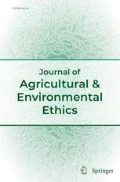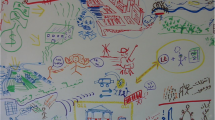Abstract
The Dutch pig husbandry has become a topic of public debate. One underlying cause is that pig farmers and urban-citizens have different perspectives and underlying norms, values and truths on pig husbandry and animal welfare. One way of dealing with such conflicts involves a learning process in which a shared vision is developed. A prerequisite for this process is that both parties become aware of their own fixed patterns of thoughts, actions, and blind spots. Therefore, we conducted five homogeneous focus groups consisting of either urban-citizens or pig farmers. The first part of the sessions aimed to make the participants aware of their own perspectives and underlying norms and values concerning animal welfare, farm practices or consumer behavior. Then, by the use of role-play and film fragments showing the perspectives of the other party, we aimed to stimulate frame reflection. The farmers maintained their own perspective and defended their practices. They denied the perspective of the urban-citizens by portraying them as ignorant of the “factual” farm practices. They proposed the use of one-way information, but our results indicate that this is likely to fail as a strategy to support or restore public acceptance. Our case shows hardy any consensus regarding the relevance of the facts at stake and a very limited amount of shared values. However, the shared love for animals together with the recognition by the urban-citizens of the inescapable dilemma for farmers to adopt a use-framing towards animals might provide an opening for further learning strategies.

Similar content being viewed by others
Notes
Formally, a mega-stable has at least 7500 fattening pigs or 1200 sows. http://edepot.wur.nl/41420. Last retrieved at February 2012.
One of the biggest citizen initiatives with more than 33,000 signatures was Megastallen Query-Nee (Mega-stables—No): http://www.megastallen-nee.nl. Last retrieved at February 2012.
Meat can be valued up to three stars, where each star represents higher welfare standards. http://www.ah.nl/meerdoen/dierenwelzijn/varken#overzichtvarken. Last retrieved at February 2012.
The website of the citizen initiative Megastallen-Nee (Mega-stables—No) shows an overview of media related to mass stables. http://www.megastallen-nee.nl. Last retrieved at February 2012.
Another citizen initiative than Megastallen-Nee was organized by the NGO Friends of the earth Netherlands in October 2009. http://www.milieudefensie.nl/nieuws/archief/milieudefensie-start-burgerinitiatief-tegen-megastallen-utrecht. Last retrieved at February 2012.
Also Dutch professors joined forces against factory farming. http://www.duurzameveeteelt.nl/english. Last retrieved at February 2012.
Care farms: "The use of commercial farms and agricultural landscapes as a base for promoting mental and physical health, through normal farming activity"(Hine et al. 2008).
References
Aarts, M. N. C., & Hanning, C. (2001). Hoe oordelen we over de veehouderij? Den Haag: Rathenaut Insituut.
Bauer, R. (1964). The obstinate audience: The influence process from the point of view of social communications. The American Psychologist, 19(5), 319–328.
Beekman, V., & Van der Weele, C. N. (2004). Naar een gereedschapskist voor constructieve ethiek. LEI.
Beekman, V., Dagevos, H., Van der Weele, C. N., & de Greef, K. (2003). Diergericht ontwerpen: Consumentenwensen rond dierenwelzijn. Lelystad: Wageningen-UR.
Benard, M., Vriend, H., Haperen, P., & Beekman, V. (2010). Science and society in dialogue about marker assisted selection. Journal of Agricultural and Environmental Ethics, 23(4), 317–329.
Bennett, R. M., Anderson, J., & Blaney, R. J. P. (2002). Moral intensity and willingness to pay concerning farm animal welfare issues and the implications for agricultural policy. Journal of Agricultural and Environmental Ethics, 15(2), 187–202.
Blandford, D., & Fulponi, L. (1999). Emerging public concerns in agriculture: Domestic policies and international trade commitments. European Review of Agricultural Economics, 26(3), 409–424. doi:10.1093/erae/26.3.409.
Boogaard, B. K., Boekhorst, L. J. S., Oosting, S. J., & JT, S Ãrensen. (2011). Socio-cultural sustainability of pig production: Citizen perceptions in the Netherlands and Denmark. Livestock Science, 140(1–3), 189–200.
Boogaard, B. K., Oosting, S. J., & Bock, B. B. (2006). Elements of societal perception of farm animal welfare: A quantitative study in The Netherlands. Livestock Science, 104(1–2), 13–22.
Bos, A. P., Spoelstra, S. F., Groot koerkamp, P. W. G., De greef, K. H., & van Ejik, O. N. M. (2012). Reflexive design for sustainable animal husbandry: Mediating between niche and regime. In G. Spaargaren, A. Loeber, & P. Oosterveer (Eds.), Food practices in transition, Changing food consumption, retail and production in the age of reflexive modernity (pp. 229–256). London: Routledge.
Brom, F. W. A. (2000). Food, consumer concerns, and trust: Food ethics for a globalizing market. Journal of Agricultural and Environmental Ethics, 12(2), 127–139.
Commission, E. (2007). Attitudes of EU citizens towards animal welfare. Special Eurobarometer 270/wave 66.1.
de Rooij, S. J. G., de Lauwere, C. C., & van der Ploeg, J. D. (2010). Entrapped in Group Solidarity? Animal Welfare, the Ethical Positions of Farmers and the Difficult Search for Alternatives. Journal of Environmental Policy & Planning, 12(4), 341–361. doi:10.1080/1523908x.2010.528882.
Dunn, W. N. (1988). Methods of the second type: Coping with the wilderness of conventional policy analysis. Review of Policy Research, 7(4), 720–737.
EL&I, D. m. o. (2011). Letter and report on the Dutch societal perspectives on mass stables. (vol http://www.rijksoverheid.nl. Assessed 16 September 2011).
Fraser, D., Weary, D. M., Pajor, E. A., & Milligan, B. N. (1997). A scientific conception of animal welfare that reflects ethical concerns. Animal Welfare, 6, 186–205.
Frewer, L. J., Kole, A., Kroon, S. M. A. V., & Lauwere, C. (2005). Consumer Attitudes Towards the Development of Animal-Friendly Husbandry Systems. Journal of Agricultural and Environmental Ethics, 18(4), 345–367.
Gadamer, H. (1965). Wahrheit und methode: Grundzüge einer philosophischen hermeneutik.
Gross, A. G. (1994). The roles of rhetoric in the public understanding of science. Public Understanding of Science, 3(1), 3–23. doi:10.1088/0963-6625/3/1/001.
Hanssen, L., Dijkstra, A. M., Roeterdink, W., & Stappers, J. (2003). Wetenschapsvoorlichting: Profetie of professie. Stichting Weten: Een confrontatie tussen communicatietheorie en voorlichtingspraktijk.
Hine, R., Peacock, J., & Pretty, J. (2008). Care farming in the UK: Evidence and Opportunities. Report for the National Care Farmin Initiative (UK): University of Essex.
Hisschemöller, M., & Hoppe, R. (1995). Coping with intractable controversies: The case for problem structuring in policy design and analysis. Knowledge, Technology & Policy, 8(4), 40–60.
Horlings, L. G., & Hinssen, J. P. P. (2010). Sustainable innovation in intensive animal husbandry in the Netherlands. Paper presented at the Scaling and Governance: Wageningen.
Kitzinger, J. (1994). The methodology of Focus Groups: The importance of interaction between research participants. Sociology of Health & Illness, 16(1), 103–121.
Kupper, J. F. H. (2009). Democratizing Animal Biotechnology : Inquiry and Deliberation in Ethics and Governance. Amsterdam: Vrije Universiteit.
Kupper, F., & De Cock Buning, T. (2011). Deliberating Animal Values: A Pragmatic-Pluralistic Approach to Animal Ethics. Journal of Agricultural and Environmental Ethics, 24(5), 431–450.
Lassen, J., Sandoe, P., & Forkman, B. (2006). Happy pigs are dirty! - conflicting perspectives on animal welfare. Livestock Science, 103(3), 221–230.
Marie, M. (2006). Ethics: The new challenge for animal agriculture. Livestock Science, 103(3), 203–207.
Miele, M., Veissier, I., Evans, A., & Botreau, R. (2011). Animal welfare: Establishing a dialogue between science and society. Animal Welfare, 20, 103–117.
Moon, J. A. (2004). A handbook of reflective and experiential learning theory and practice. http://search.ebscohost.com/login.aspx?direct=true&scope=site&db=nlebk&db=nlabk&AN=102749.
Osseweijer, P. (2006). A Short History of Talking Biotech : Fifteen years of iterative action research in institutionalising scientists’ engagement in public communication. Amsterdam: Vrije Universiteit.
Percy, R. (2005). The contribution of transformative learning theory to the practice of participatory research and extension: Theoretical reflections. Agriculture and Human Values, 22(2), 127–136.
Schön, D. A., & Rein, M. (1994). Frame Reflection: Toward the Resolution of Intractable Policy Controversies: Basic Books.
Serpell, J. (1986). In the company of animals: A study of the human-animal relationship. Cambridge, UK: Cambridge University press.
Stassen, E. N. (2006). Van bruikbaar tot dierbaar, over de relatie mens-dier. Wageningen: Wageningen University and Research Centre.
Swinnen, J. F. M., McCluskey, J., & Francken, N. (2005). Food safety, the media, and the information market. Agricultural Economics, 32, 175–188.
Te Velde, H., Aarts, N., & Van Woerkum, C. (2002). Dealing with Ambivalence: Farmers’ and Consumers’ Perceptions of Animal Welfare in Livestock Breeding. Journal of Agricultural and Environmental Ethics, 15(2), 203–219.
Termeer, C. J. A. M., Breeman, G. E., Lieshout, M., & Pot, W. D. (2010). Why more knowledge could thwart democracy: Configurations and fixations in the Dutch mega-stables debate. In Knowledge Democracy (Ed.), Consequences for Science, Politics, and Media (pp. 99–111). Heidelberg: Springer.
Van Eijk, ONM., de Lauwere, C. , van Weeghel, E., Kaal-Lansbergen, L., Miedema, H., Ursinus, A., et al. (2010). Pork Opportunities. Three design directions for economically, ecologically and socially sustainable pig production and steps towards realisation: Wageningen UR Livestock Research.
Vanhonacker, F., Van Poucke, E., Tuyttens, F., & Verbeke, W. (2010). Citizens’ Views on Farm Animal Welfare and Related Information Provision: Exploratory Insights from Flanders, Belgium. Journal of Agricultural and Environmental Ethics, 23(6), 551–569.
Vanhonacker, F., Verbeke, W., Van Poucke, E., & Tuyttens, F. A. M. (2008). Do citizens and farmers interpret the concept of farm animal welfare differently? Livestock Science, 116(1–3), 126–136.
Veldkamp, A., Altvorst, A. C., Eweg, R., Jacobsen, E., Kleef, A., Latesteijn, H., et al. (2009). Triggering transitions towards sustainable development of the Dutch agricultural sector: TransForum’s approach. Agronomy for Sustainable Development, 29(1), 87–96. doi:10.1051/agro:2008022
Verbeke, W., & Ward, R. W. (2001). A fresh meat almost ideal demand system incorporating negative TV press and advertising impact. Agricultural Economics, 25(2–3), 359–374.
Witte, K. (1994). Fear control and danger control: A test of the extended parallel process model (EPPM). Communication Monographs, 61(2), 113–134.
Acknowledgments
We would like to thank the anonymous reviewers of a previous version of this paper for their helpful comments. We want to thank Joere Nodelijk for his useful contribution in the execution of this research project. This research project was part of the research programme The Value of Animal Welfare and was funded by grant number 827.09.010 from The Netherlands Organisation for Scientific Research (NWO) and the Ministry of Economic Affairs, Agriculture and Innovation (EL&I).
Author information
Authors and Affiliations
Corresponding author
Rights and permissions
About this article
Cite this article
Benard, M., de Cock Buning, T. Exploring the Potential of Dutch Pig Farmers and Urban-Citizens to Learn Through Frame Reflection. J Agric Environ Ethics 26, 1015–1036 (2013). https://doi.org/10.1007/s10806-013-9438-y
Accepted:
Published:
Issue Date:
DOI: https://doi.org/10.1007/s10806-013-9438-y




